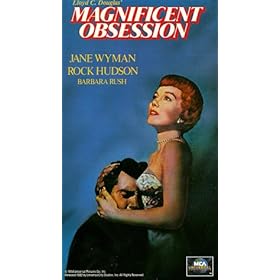
Magnificent Obsession is one of my favourite movies, for all kinds of reasons. Mostly because it's a film I saw several times on television as a child, and its settings and plot remained vivid in my memory for years afterward. I picked up a copy in Singapore a few years ago, and watched it over and over again, absolutely in love with its overwrought performances and implausible plot.
I also recognised something that had gone over my head as a child - the film's plot is overtly religious, though until now I've never really been able to get my head around the mysterious theology that informs the plot.
A couple of weeks ago I bought a new edition of the DVD, and it's simply marvellous. It features the original 1935 version of the film, as well as the 1954 feature (the one I love) with a fascinating commentary by Australian film historian Dr. Mark Nicholls.
Put quite simply, the film is a brilliant (if slightly over-stated) enunciation of the philosophy of New Thought. The original novel on which it was based was written by Lloyd Douglas, a retired clergyman who moved more and more toward New Thought ideas as he pursued a career as a novelist. The novel was greatly beloved by those in the New Thought field, and it is quoted at length in Napoleon Hill's Success Through a Positive Mental Attitude. In that book he advocates that all people should develop "a magnificent obsession" just as the character Bob Merrick does in the book and later the film.
Apparently the director Douglas Sirk was largely unaware of, and uninterested in, the film's underlying philsophy. He couldn't get through the novel on which it was based, and he never saw the original version of the film, in which the New Thought ideas are much more explicitly, and repeatedly, stated.
Of course, the degree of absurdity and high improbability of Bob Merrick's achievements in the film (becoming a brain surgeon in order to save the life of the woman he loves) tempers the power of its message to a modern audience. But it is nevertheless filled with a naive, melodramatic charm, and I defy anyone not to cry during its closing scene.
